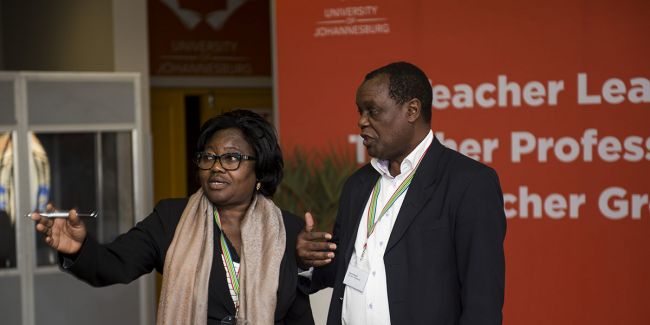Africa: Professional development key to boosting teaching profession
Twelve different African countries were represented at the “Seminar on the Future of the Teaching Profession in Africa: Teacher learning, professionalism and growth”, held in August in South Africa. Organised jointly by Education International (EI), The Open Society Foundations (OSF), and the University of Johannesburg on 28-29 August, the event gathered 40 participants, including experts, union leaders, and practitioners.
Hosted by the University of Johannesburg (UoJ), the seminar worked on the definition of standards for the profession, aiming to reinforce the advocacy capacity of education unions on the ground and increase the quality of education in African countries. There was a lot of emphasis on the need to provide professional development and learning opportunities in order to increase the level of teaching and, with it, the education system as a whole.
Common challenges
Composed of three strands - learning, professionalism, and professional development – the seminar was opened by OSF director Hugh Mac Lean with the presentation of the results of a survey in which participants had been asked to describe the common challenges faced by teachers prior to the meeting. Those challenges included teacher learning, school leadership, the status of teachers, and the role of unions in the definition of educational policy.
This was followed by a school visit to Bhukulani Secondary School and two local primary schools, in line with the seminar’s practical and hands-on approach. Delegates who later shared their observations from the visits underlined the importance of the teacher-student ratio, the community and social environment of the schools and the role played by infrastructure and technology. ‘Starting the seminar with classroom visits was crucial to our commitment to focussing on pedagogy and the actual realities of teaching. At Bhukulani we saw engaged students in discursive classrooms learning about everything from the importance of voting to the nature of atoms. Delegates were vociferous for their support in starting the seminar in a practical setting and said they had much to take back to their own countries about what good teaching conditions look like in Africa’, said EI research coordinator Martin Henry.
Keynote speaker Mary Metcalfe, Senior Research Associate at the UoJ, briefed participants on the hurdles faced by teachers. These include a lack of professional development, the difficulty in changing and adapting different types of teaching practices, the hierarchical design of education institutions, and the lack of access to further education for teachers.
Learning circles
One of the main strengths of the seminar was the participation of union leaders with a high degree of expertise. Agustine Tumba Nzuji, from the Democratic Republic of Congo, reported that, in his country, 30 percent of the population was illiterate and only two-fifths of children attended school. With a teacher’s salary averaging US$45 per month and irregular payments, the education system finds itself in dire straits.
He described how his union, FENECO/UNTC, set up innovative learning circles, in which small groups of teachers discuss their tasks and the obstacles they face. He explained that this programme is proving very helpful and is also attracting more members to the union.
Implementing changes
As a result of the seminar, Dennis Sinyolo, senior coordinator for Education and Employment at EI, was interviewed by the South African television broadcaster, eNCA, on the quality of education and the status of teachers. He highlighted the critical shortage of teachers in Africa and globally, with 69 million more teachers needed worldwide to achieve the Sustainable Development Goals (SDGs) by 2030. This, combined with the lack of training of some existing teachers, is hampering the achievement of quality education for all, he said.
Regarding Africa, he noted the “plummeting” status of teachers, which has led to a steady decrease in the attractiveness of the profession for young aspirants, and the problem that class size poses to both teaching and learning. The answer to these problems, according to Sinyolo, is the enhancement of the status of teachers.
Professional development
Another point that emerged strongly from the conference is the need to strengthen teacher education systems and the mechanisms for supporting teachers, including through professional development. To achieve this, EI is teaming up with UNESCO to develop a framework of international teaching standards that will inform and strengthen national standards.
[youtube]25kLcGdN8OA[/youtube]

[Wed, 05 Sep 2018 14:35:00 +0000] | DIGG THIS
Education International · No. 3 Torshie Close, · Mempeasem · East Legon Extension · Accra · Ghana
Phone: +233.302.50.12.00 · Fax: +233.302.50.66.81 · Email: eirafoffice@ei-ie.org
